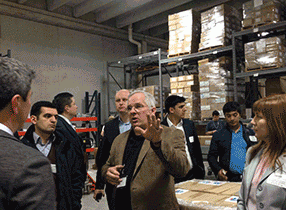Eurasian supply chain leaders tour U.S., learn about ATC’s training program and Roadmap
For three weeks in March, a delegation of 20 executives and heads of logistics departments from Eurasian countries Azerbaijan, Kazakhstan, Russia, Tajikistan, Turkmenistan, Ukraine and Uzbekistan toured select cities in the U.S. The group visited Washington D.C., Atlanta, Charlotte and Chicago through the Special American Business Internship Training (SABIT) program(which also has a page on Facebook) under theU.S. Department of Commerce’s International Trade Administration.
The SABIT program’s 2015 Eurasian Supply Chain Management Delegation was escorted by Becky Long, International Trade Specialist, and a pair of interpreters. Comprised of CEOs and executives, the delegates’ companies are involved in logistics, warehousing and retail/wholesale, as well as manufacturing in the food processing, consumer goods, electronics, pharmaceuticals, and chemicals industries.
For more than 20 years, the SABIT program has offered delegates from international companies a chance to learn about best practices in various industries by arranging meetings with U.S. companies, trade organizations and educational institutions. This was the first year the SABIT program hosted a delegation focused on supply chain management.
Among the educational institutions toured was the Rock Hill, South Carolina School District’s Applied Technology Center. The delegates spent a morning observing high school students in the Don Frazier Supply Chain Training Program, and learning more about training opportunities at the secondary education level, says Don Gillman, ATC Director.
“They asked questions about our school and how it operates. Because we serve three different high schools, students are bused to and from our school throughout the day for career and technical classes,” he recalls. “The delegates also asked about the emphasis we place on essential workplace skills/soft skills development. They noticed the posters and displays adorning our hallways and classrooms/labs.”
Gillman says the executives also seemed quite impressed with the ages of the students and the tasks they tackle as part of the program’s hands-on learning curriculum.
“We have students from 14 to 18 years old actively engaged in on-campus warehouse facilities, operating forklifts, automated storage and retrieval machines, stretch-wrap equipment, warehouse management software and other equipment,” he explains. “I got the sense that similar education programs may not exist in their home countries.”
The delegation watched ATC students run the Back the Pack program, which organizes, packages and distributes non-perishable food items to Rock Hill school system children in need. The students also partner with the First Book organization in Washington D.C. to run an on-site book distribution program. This partnership lets students learn about receiving, organizing, order picking, packing and shipping in a real-world environment.
“We were happy to host the delegates, not only as a chance to introduce them to our school’s material handling and logistics program, but it’s also important for our students to see their class and teacher get international attention,” Gillman continues, noting that local Rock Hill news station CN2covered the group’s ATC visit. “Supply chain and material handling are key parts of a huge, international industry, and the delegation’s visit helps our students to start thinking bigger in terms of their career.”
Also during their time at the ATC, the group was introduced to the U.S. Roadmap for Material Handling & Logistics via a presentation from Gary Forger, MHI’s Managing Director of Professional Development. Forger presented a brief overview of the document, piquing the group’s interest.
When their trip concluded with four days at ProMat, they learned even more about the latest Roadmap-related industry developments during the 2015 MHI Annual Industry Report keynote. Several participants commented to Long that they saw international applicability in the document, and subsequently asked her to include a copy in the follow-up information sent to them after their tour.





